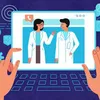The practice of medicine is one where innovation is literally a matter of life or death, there’s always an urgent need for a new test to diagnose a mysterious new disease and a new miracle treatment to save someone afflicted by it. Innovation in healthcare is essential, and those pushing medicine’s boundaries have the supreme motivation to do so; they want to alleviate suffering and save lives. As we turn the corner on 2020, we find ourselves in the midst of the worst pandemic in a century and humanity’s brightest minds are focused on rapidly innovating healthcare solutions for pandemic-scale problems to save lives.
This pandemic threatens the foundations of our healthcare apparatus and rapid innovation is the only way to fight back.
The failure to scale healthcare systems over the last few decades has resulted in intense pressure to scale pandemic response in months; it is unequivocally clear that as a result our health systems will be transformed in the post pandemic world.
Let’s explore the major anticipated transformation.
Artificial Intelligence – the cure all for natural stupidity?
In the decade since 2010, smart phones “apps” went from buzzwords to integral parts of healthcare delivery. As we turn the corner on 2020, AI has already transformed several other industries and is no longer just a buzzword in healthcare. Radiology is an excellent example of AI’s impact.
AI radiology platforms have a reference database of millions of scans while the average radiologist has few thousand; AI can see shades of grey that the human eye just does not appreciate. Radiology is about recognising patterns and AI powered by pentabytes of data is able to identify patterns invisible to many human radiologists.
The best human radiologists may out diagnose the best AI radiology tools but Deep Blue beat one of history’s best chess players, Gary Kasparov, back in 1997 and AI has come a long way since 1997. Lord Byron once said “The best prophet of the future is the past” and AI can now model pandemics, discover new drugs and diagnose diseases; time is unlikely to be friendly to AI wary radiologists.
While AI may have to do a little more than just pass the Turing test to replace primary care physicians, some healthcare startups are focusing on using AI to augment rather than replace doctors, and the future doctors may be AI-powered cyborgs of sorts.
Wearables, point-of-care testing and the Internet of Things
Many of us have used internet connected devices to monitor our health but in the past we were left to make our own inferences from the data generated. Modern wearables are very different; fitness trackers have detected and alerted wearers of cardiac emergencies thereby saving lives, some wearables help improve sleep and others coach athletes to perform optimally. Wearables are adding more and more sensors and they are getting so accurate that doctors can rely on them.
Modern wearables can give both the wearer and their doctors deep insights into health and the Internet of Things connects many devices into commons platforms.
Similarly, points-of-care testing devices are allowing users and doctors to rapidly get laboratory quality information from just a tiny drop of blood.
While many are familiar with point-of-care glucose meters, the new generation of such devices can check kidney function, lipids, screen for infectious diseases and provide data that allows doctors to rapidly investigate their patients. Point-of-care testing is already available in several practices and soon such devices will integrate with telemedicine and home care platforms to revolutionise the healthcare access and delivery.
Blockchain
As a general rule the easier it is to access data, the less secure it is. One of the great challenges in healthcare is to make health data more accessible to patients, doctors, pharmacists, labs, etc. while also preventing data leaks and misuse.
Blockchain makes it easy for verified people of access data while also keeping it secure and it is likely going to be one of the revolutionary but behind the scenes innovations in healthcare.
Personalised medicine
Very often different patient respond very differently to the same treatments. While there are multiple reasons; genetic, immunologic and lifestyle-related, the patient who responds poorly to a particular treatment will take no solace in any of these reasons. Patient expects results even if the reason for a poor response is intrinsic to their biology.
One of the most exciting innovations in medicine is personalising medicine to the patients specific variables be they genetic, immunologic or lifestyle-related. Advances like next generation sequencing and proteomics have provided deep insights into individual patients and machine learning is helping doctors decipher patterns that allow precise medicines to be administered at precise times to enable precise outcomes.
AI is a key component of this advancement and soon we will be able to prescribe medicines after understanding how well a particular patient will respond to them and based on which medication is likely to cause side effects in a specific patient.
Do it yourself health
One of the most disappointing things about the healthcare industry is the power skew between patients and doctors; a patient is often at the mercy of the superior knowledge of the doctor. It is in the nature of medicine for the doctor to be the holder of key powerful knowledge that has a massive bearing on the patient’s future.
While many doctors are benevolent stewards of this power, healthcare remains one of the few sectors where the person paying for a service is not the king or queen. As many different innovations like AI, wearables, point-of-care testing and patient communities converge, one of the major coming disruptions in the healthcare industry will patient empowerment. Doctors should embrace this disruption because empowered and engaged patients have better health outcomes.
Just as many diabetics have been empowered to check their own blood glucose and administer an appropriate amount of insulin, in the future, innovative technologies will facilitate DIY health like never before. For some, that future starts now and DIY health will truly be the healthcare sectors most innovative transformation.
(Disclaimer: The views and opinions expressed in this article are those of the author and do not necessarily reflect the views of YourStory.)
Link : https://yourstory.com/2020/11/new-innovations-healthcare-industry
Author :- Dr. Swapneil Parikh ( )
November 22, 2020 at 01:24PM
YourStory


